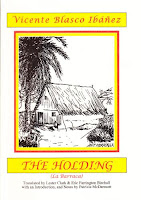 This passionate and moving story of social injustice, violence and revenge, set in the Valencian huerta, has become the classic text of Spanish regional realism. Blasco Ibanez, the 'Spanish Zola', dramatically confronts one of the great social issues of the late nineteenth century, the possession of land, in a vivid recreation of the local types and traditional customs of a closed rural community which jealousy guards its rights and administers its own rough justice against the outsider. This novel is both a lyrical hymn to nature and an expose of man's inhumanity to man, narrated with a human compassion worthy of his master, Galdos.
This passionate and moving story of social injustice, violence and revenge, set in the Valencian huerta, has become the classic text of Spanish regional realism. Blasco Ibanez, the 'Spanish Zola', dramatically confronts one of the great social issues of the late nineteenth century, the possession of land, in a vivid recreation of the local types and traditional customs of a closed rural community which jealousy guards its rights and administers its own rough justice against the outsider. This novel is both a lyrical hymn to nature and an expose of man's inhumanity to man, narrated with a human compassion worthy of his master, Galdos.
Batiste and his family, poverty stricken and homeless, move into farm land that has been abandoned for ten years. Thinking themselves to be fortunate to get such a good offer from the landlord, they ignore the supposed "curse" on the land that is left from the previous tenant. But the locals haven't forgotten Barret, the old owner, and will do anything to protect his land from being possessed by a new tenant. Thus Batiste and his family are plagued by hostility, rumours and insults from the second they move in. The family are struck by continual misfortune, ultimately causing them to regret ever having dreamt that they could escape their previous poverty in this supposedly plentiful red soil.
In a strange way, I did enjoy reading this book. It is wonderfully written and the land truly comes alive through the descriptions, but this doesn't detract from how depressing the story is. I won't spoil the ending, but I will say that it isn't positive and uplifting in any way. While Ibanez made clear the plight of the tenant farmers in late 19th century Spain, I just couldn't get my head around how hostile the locals were to innocent Batiste and his family. It seemed absurd that they would hate them simply because they had taken up residence in the land that used to belong to their friend, when it was clear that they weren't intending to disrespect Barret, just wanting to make enough money to feed and clothe their family. I'm sure that there were many struggles like this at the time, but I couldn't help but be perplexed by the behaviour of the characters.
I would recommend this book to anyone interested in the area, time period or just Spanish literature in general. This book is hard to get hold of, unless you're willing to fork out £15+, but it is worth the read. Just be aware that there are few positive moments in this novella! 7/10
No comments:
Post a Comment